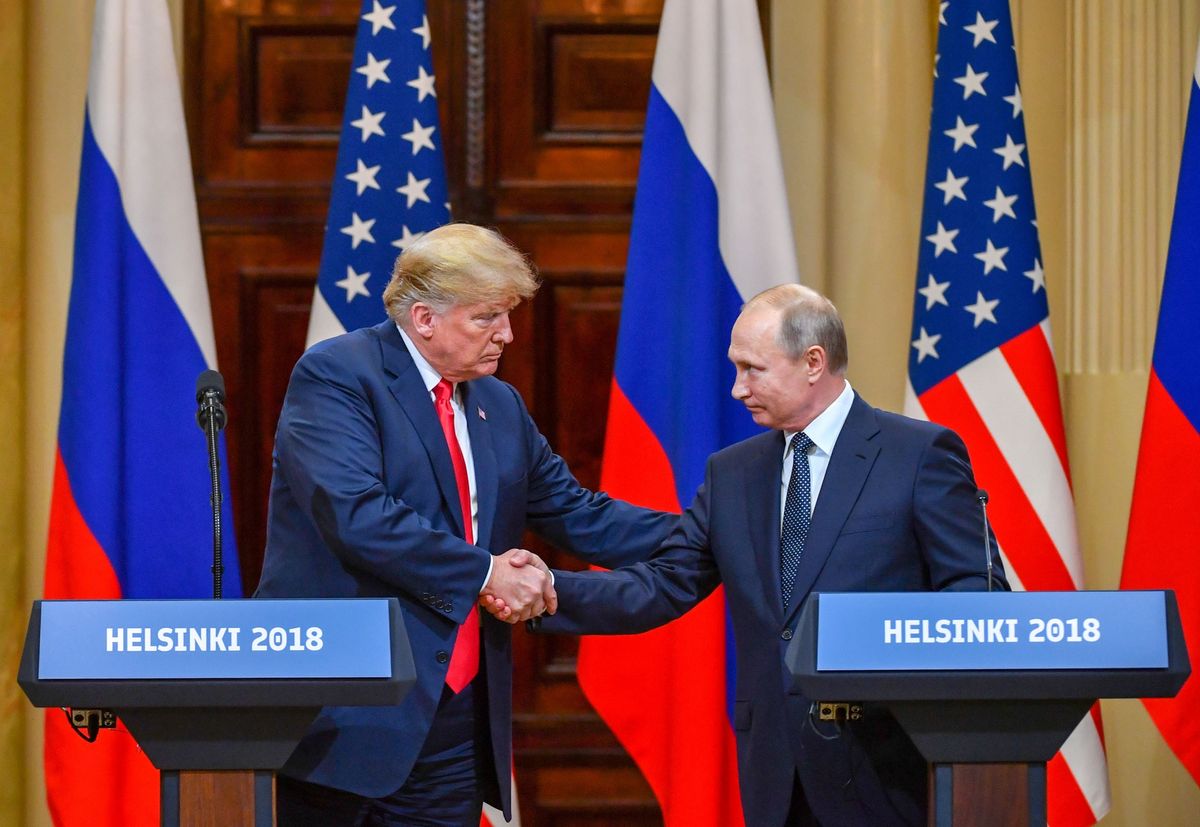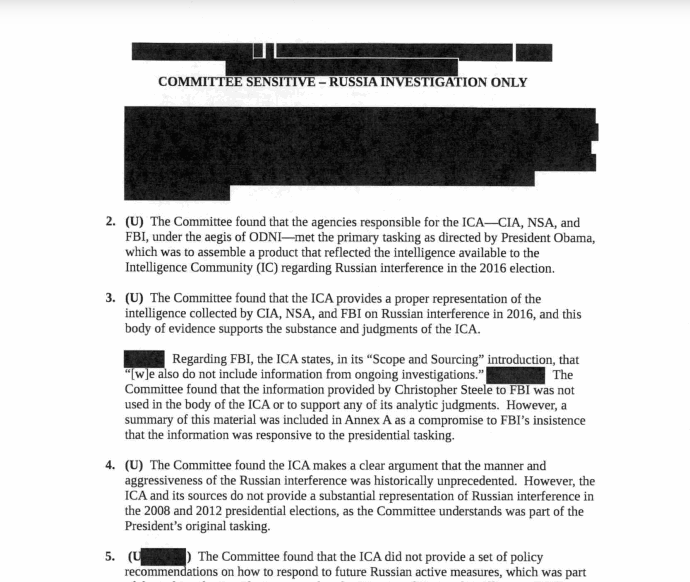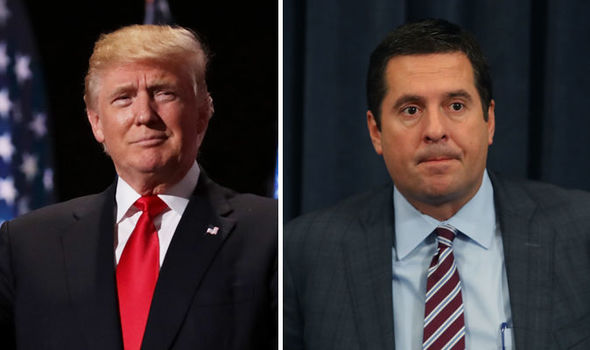Republican-led Senate Intelligence Committee confirms Russia interfered in 2016 to help elect Trump

A few minutes every morning is all you need.
Stay up to date on the world's Headlines and Human Stories. It's fun, it's factual, it's fluff-free.
The Senate Intelligence Committee has reaffirmed that Russian operatives interfered in the 2020 election to help President Donald Trump secure his victory.
The Republican-led committee’s review verified the Intelligence Community Assessment (ICA) that had been presented to former President Barack Obama on December 30, 2016.
The United States’ intelligence community – which comprises the Federal Bureau of Investigation (FBI), the Central Intelligence Agency (CIA) and the National Security Agency (NSA) – has consistently maintained that Russian President Vladimir Putin has overseen a widespread propaganda and disinformation campaign aimed at the US.
Despite the evidence, Presidents Trump and Putin have both denied Russian interference in the 2016 election.
What did the Senate Intelligence Committee determine?
The heavily redacted report was actually the fourth volume released by the committee on Russian interference in the 2016 election. Among its conclusions is that President Vladimir Putin “ordered [the] campaign to influence US election” and that the campaign was “multifaceted.”

As examples of the multifaceted nature of the campaign, the report lists five sub-headings (one is redacted): “Cyber Espionage Against U.S. Political Organizations,” “Public Disclosures of Russian-Collected Data,” “Russian Cyber Intrusions Into State Electoral Infrastructure” and “Russian Propaganda Efforts.”
The report determines that the collective analysis by the US’s three main intelligence gathering agencies – the CIA, FBI and NSA – was accurate and properly conducted. It confirmed that Putin’s aim was to help Trump win the 2016 election while hurting his opponent, former Secretary of State Hillary Clinton.
The report quotes a redacted source as saying, “Moscow’s campaign aimed at the U.S. election reflected years of investment in its capabilities, which Moscow has honed in the former Soviet states.” This aligns with reports that current Russian President Vladimir Putin has been relying on his experience as a former KGB agent to craft multiple disinformation campaigns worldwide.
The report further states that “Since January 2017, the Committee has discovered additional examples of Russia’s attempt to sow discord, undermine democratic institutions, and interfere in U.S. elections.” The committee also determined that Russia had attempted to interfere in the elections of the nation’s allies, as had previously been reported.
According to the chairman of the committee, Richard Burr, “The committee found no reason to dispute the intelligence community’s conclusions.”
The final report was unanimously approved by the entire committee.
Conflicts with the House Intelligence Committee
As laid out by Axios, the Senate’s report conflicts considerably with the 2018 House Intelligence Committee’s report, which was also overseen by Republicans. The House’s report contested the conclusions of the intelligence community and denied that there was evidence that Russia had sought to actively help Trump.
The House Intelligence Committee further argued that the intelligence community had not met proper analytical standards in their assessment. The Senate’s report flatly refutes that stance, stating that the ICA had “a coherent and well-constructed intelligence basis for the case of unprecedented Russian interference in the 2016 U.S. presidential election.”
Notably, the Senate’s report also found that the ICA did not rely on the Steele Dossier. That dossier was compiled by British spy Christopher Steele and included inflammatory allegations against Trump. Trump’s Republican defenders have erroneously claimed that the Steele Dossier was the basis for the initial investigation into Trump’s connection to Russia.
The chairman of the House Intelligence Committee at the time of their report was Republican Representative Devin Nunes, one of Trump’s strongest allies.

Nunes himself is facing an investigation for ethics violations after failing to disclose a meeting he had with a former Ukrainian official. That meeting was intended to gather incriminating evidence against former Vice President Joe Biden, Trump’s opponent in the 2020 election.
Who are the members of the Senate Intelligence Committee?
The chairman of the Senate Intelligence Committee is Republican Senator Richard Burr. The senator from North Carolina has ignored repeated calls to resign after it was discovered that he had sold stocks in the weeks prior to the COVID-19 crisis. As a member of the Committee, he had been briefed on the impending crisis well before the American people knew the full extent of it.

The vice chairman of the Committee is Mark Warner, a Democratic senator from Virginia. There are seven other Republican members of the Committee: James Risch, Marco Rubio, Susan Collins, Roy Blunt, Tom Cotton, John Cornyn and Ben Sasse.
Besides Warner, there are five Democrats on the Committee: Dianne Feinstein, Ron Wyden, Martin Heinrich, Kamala Harris and Michael Bennet, as well as one Independent, Angus King, who caucuses with the Democrats.
Continued Russian interference
As far back as September 2016, Trump has been denying that Russia made any efforts to interfere in the election. He has repeatedly questioned the findings of his own intelligence agencies, even siding with Putin. The Russian president has also repeatedly denied meddling in any US election.
The Senate, led by Republican Majority Leader Mitch McConnell, has blocked multiple bills aimed at shoring up the nation’s election security. Among the bills blocked were stipulations that would require all campaigns to officially report if they are contacted by foreign entities offering election assistance.
US intelligence has said that Russia is already working on interfering in the 2020 election to help Trump get re-elected. It was also previously reported that Russians were seeking to help the campaign of Senator Bernie Sanders. Sanders, who has since dropped out of the race, denounced any efforts from Russia on his behalf at the time.
Though the ICA affirmed Russia’s efforts to help Trump win in 2016, Trump’s victory may not have been the main goal of interference. Experts on Russian disinformation campaigns have warned that the underlying aim of such campaigns is undermining faith in institutions and weakening democracies.
[article_ad]
Have a tip or story? Get in touch with our reporters here!
Sign up for daily news briefs from The Millennial Source here!




Comments ()